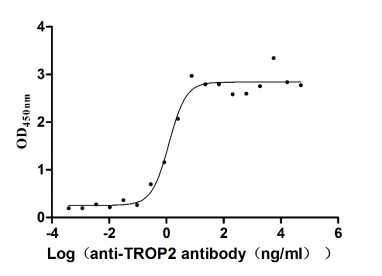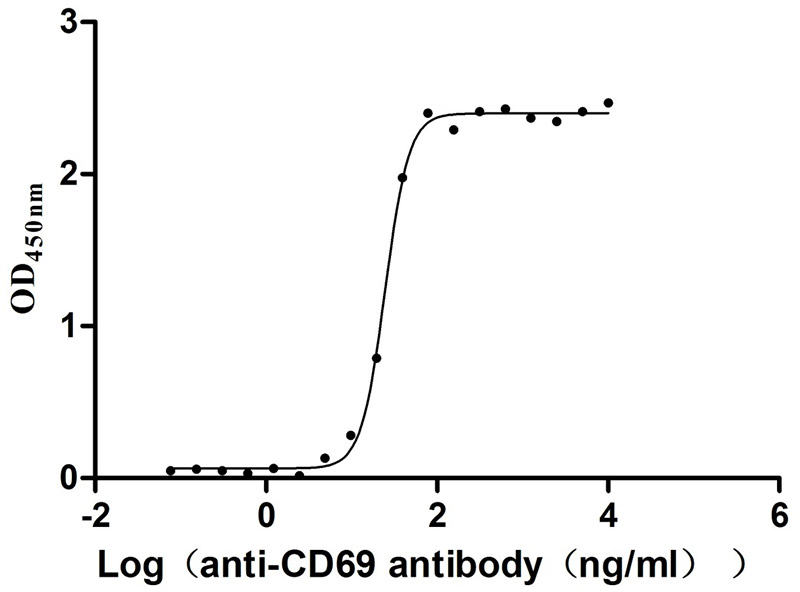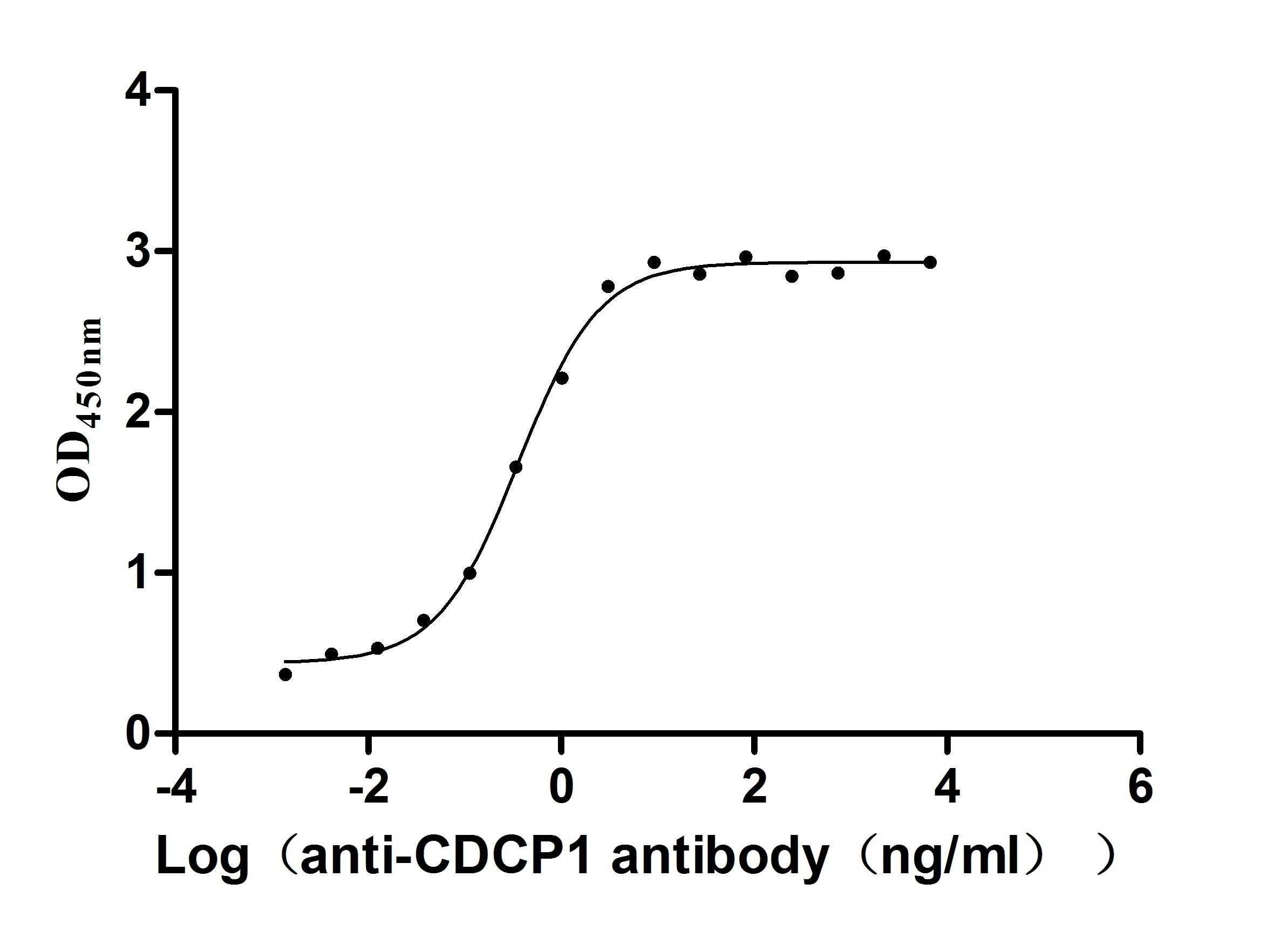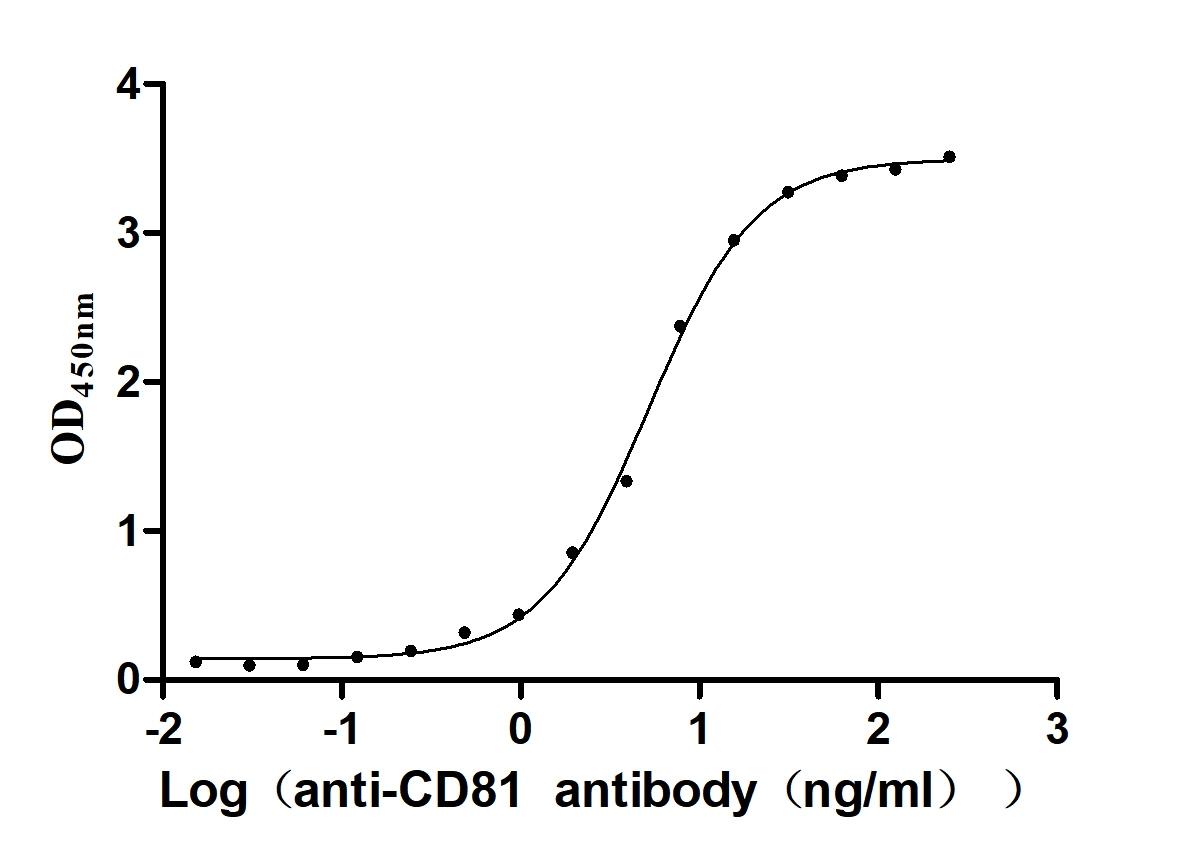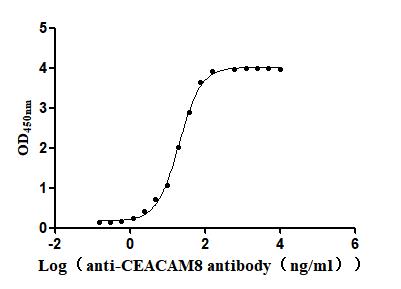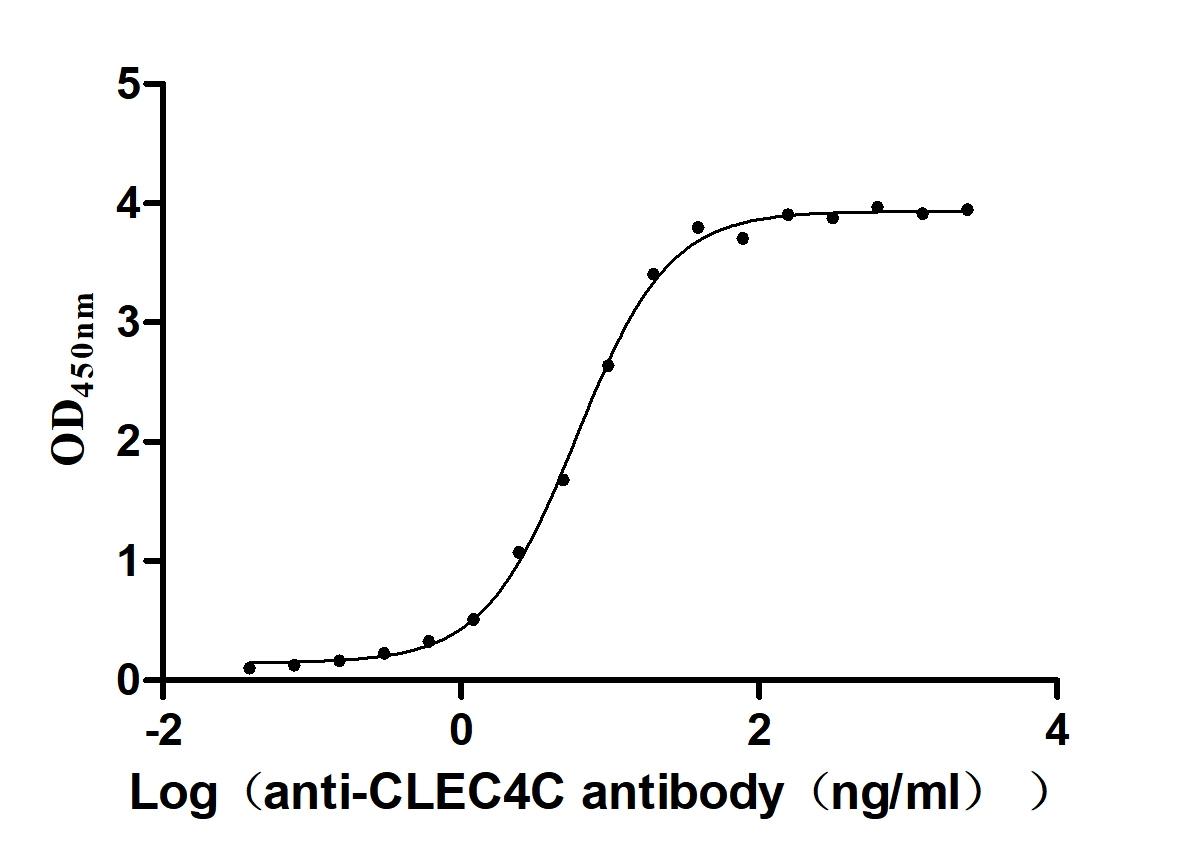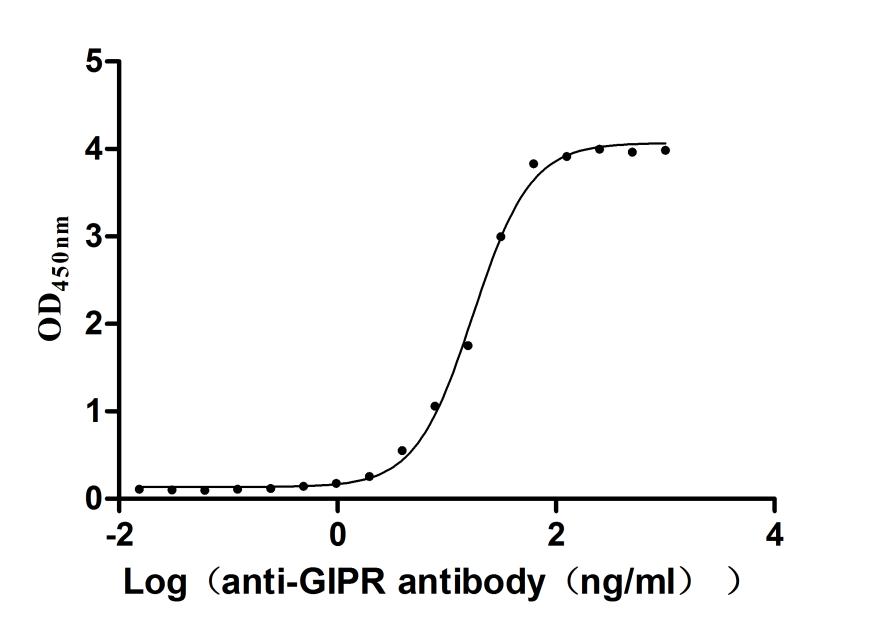Recombinant Human Secreted frizzled-related protein 4 (SFRP4)
-
货号:CSB-YP021140HU
-
规格:
-
来源:Yeast
-
其他:
-
货号:CSB-EP021140HU
-
规格:
-
来源:E.coli
-
其他:
-
货号:CSB-EP021140HU-B
-
规格:
-
来源:E.coli
-
共轭:Avi-tag Biotinylated
E. coli biotin ligase (BirA) is highly specific in covalently attaching biotin to the 15 amino acid AviTag peptide. This recombinant protein was biotinylated in vivo by AviTag-BirA technology, which method is BriA catalyzes amide linkage between the biotin and the specific lysine of the AviTag.
-
其他:
-
货号:CSB-BP021140HU
-
规格:
-
来源:Baculovirus
-
其他:
-
货号:CSB-MP021140HU
-
规格:
-
来源:Mammalian cell
-
其他:
产品详情
-
纯度:>85% (SDS-PAGE)
-
基因名:
-
Uniprot No.:
-
别名:Frizzled protein; Frizzled protein human endometrium; FRP 4; FRP4; FrpHE; human endometrium; PYL; Secreted frizzled-related protein 4; sFRP-4; Sfrp4; SFRP4_HUMAN
-
种属:Homo sapiens (Human)
-
蛋白长度:Full Length of Mature Protein
-
表达区域:19-346
-
氨基酸序列VR GAPCEAVRIP MCRHMPWNIT RMPNHLHHST QENAILAIEQ YEELVDVNCS AVLRFFLCAM YAPICTLEFL HDPIKPCKSV CQRARDDCEP LMKMYNHSWP ESLACDELPV YDRGVCISPE AIVTDLPEDV KWIDITPDMM VQERPLDVDC KRLSPDRCKC KKVKPTLATY LSKNYSYVIH AKIKAVQRSG CNEVTTVVDV KEIFKSSSPI PRTQVPLITN SSCQCPHILP HQDVLIMCYE WRSRMMLLEN CLVEKWRDQL SKRSIQWEER LQEQRRTVQD KKKTAGRTSR SNPPKPKGKP PAPKPASPKK NIKTRSAQKR TNPKRV
-
蛋白标签:Tag type will be determined during the manufacturing process.
The tag type will be determined during production process. If you have specified tag type, please tell us and we will develop the specified tag preferentially. -
产品提供形式:Lyophilized powder
Note: We will preferentially ship the format that we have in stock, however, if you have any special requirement for the format, please remark your requirement when placing the order, we will prepare according to your demand. -
复溶:We recommend that this vial be briefly centrifuged prior to opening to bring the contents to the bottom. Please reconstitute protein in deionized sterile water to a concentration of 0.1-1.0 mg/mL.We recommend to add 5-50% of glycerol (final concentration) and aliquot for long-term storage at -20℃/-80℃. Our default final concentration of glycerol is 50%. Customers could use it as reference.
-
储存条件:Store at -20°C/-80°C upon receipt, aliquoting is necessary for mutiple use. Avoid repeated freeze-thaw cycles.
-
保质期:The shelf life is related to many factors, storage state, buffer ingredients, storage temperature and the stability of the protein itself.
Generally, the shelf life of liquid form is 6 months at -20°C/-80°C. The shelf life of lyophilized form is 12 months at -20°C/-80°C. -
货期:Delivery time may differ from different purchasing way or location, please kindly consult your local distributors for specific delivery time.Note: All of our proteins are default shipped with normal blue ice packs, if you request to ship with dry ice, please communicate with us in advance and extra fees will be charged.
-
注意事项:Repeated freezing and thawing is not recommended. Store working aliquots at 4°C for up to one week.
-
Datasheet :Please contact us to get it.
相关产品
靶点详情
-
功能:Soluble frizzled-related proteins (sFRPS) function as modulators of Wnt signaling through direct interaction with Wnts. They have a role in regulating cell growth and differentiation in specific cell types. SFRP4 plays a role in bone morphogenesis. May also act as a regulator of adult uterine morphology and function. May also increase apoptosis during ovulation possibly through modulation of FZ1/FZ4/WNT4 signaling. Has phosphaturic effects by specifically inhibiting sodium-dependent phosphate uptake.
-
基因功能参考文献:
- Data suggest that factors derived from conditioned medium of adipose-derived mesenchymal stem cells and sFRP4 significantly decrease cell viability and cell migration of breast tumor cells; this is accompanied by enhanced apoptosis via inhibition of canonical Wnt signal transduction. PMID: 29277675
- increased SFRP4 and ficolin-3 levels are significantly associated with gestational diabetes mellitus development and might be important risk factors for this pregnancy complication. PMID: 29491225
- High SFRP4 expression is associated with mesothelioma. PMID: 28534940
- Epicardial adipose tissue and circulating SFRP4 expression levels were increased with patients with coronary artery disease. PMID: 29037197
- Serum SFRP-4 levels were significantly higher in the type 2 diabetes group compared to the impaired glucose tolerance and normal glucose tolerance groups. PMID: 29455547
- Studied role of Secreted Frizzled-Related Protein 4 (sFRP4) in angiostasis thru nitric oxide-cGMP cell signaling. PMID: 28267592
- Progesterone regulated SFRP4 gene expression plays a role in uterine leiomyoma. PMID: 28637297
- SFRP4 expression is significantly upregulated in human masticatory mucosa during wound healing PMID: 28005267
- SFRP4 is significantly increased in patients with different types of diabetes. PMID: 26882051
- Weak sFRP4 expression appeared to predict aggressive behavior, and was associated with recurrence/progression of GH-secreting pituitary adenomas. PMID: 26935389
- A decreased risk of lung cancer was found for the genotype combination of DKK3 and sFRP4. PMID: 26457595
- Down-regulation of SFRP4 is associated with recurrence in Endometrioid Adenocarcinoma. PMID: 26397159
- proliferation of IGFBP5-mutated cancer cells is selectively blocked by IGF-1R inhibitors PMID: 26868304
- concentrations of serum SFRP4 in T2DM and impaired glucose tolerance subjects were increased and were correlated closely with glycose metabolic disorder, the first-phase of glucose-stimulated insulin secretion and chronic low-grade inflammation PMID: 26041556
- sFRP4 expression is inversely related to the aggressiveness of pituitary adenomas, and acts as a tumor suppressor. PMID: 24917361
- Wnt3a can modulate intracellular localisation and secretion of sFRP4. PMID: 25805505
- We found that miR-203 was significantly downregulated in OSF tissues compared to that in normal buccal mucosa tissues, and that miR-203 negatively regulated secreted SFRP4 and positively regulated TM4SF1 PMID: 25872484
- Serum WISP2 correlated directly with fatty acid binding protein 4. Serum SFRP5 did not differ between obese (n=32) vs. nonobese (n=25) PCOS women, but reference women had lower SFRP5 (p<5x10(-6) as compared to both PCOS groups). PMID: 25089371
- Abdominal adipose tissue is a major contributor for circulating-SFRP4; SFRP4 has an important role in obese adipose tissue pathophysiology. PMID: 25322919
- SFRP4 concentrations are associated with impaired glucose and triglyceride metabolism PMID: 25408147
- findings suggest that an epigenetic event is critically involved in the pathogenesis of psoriasis, and the downregulation of SFRP4 by CpG island methylation is one possible mechanism contributing to the hyperplasia of epidermis in the disease PMID: 25825452
- Increased SFRP4 expression may not always correlate with an increase in apoptosis, possibly due to the complex interactions between different signalling pathways. [Review] PMID: 25501511
- total of three potential inhibitors of SFRP4 were found, namely cyclothiazide, clopamide and perindopril. These inhibitors showed significant interactions with SFRP4 as compared to other inhibitors as well as control (acetohexamide). PMID: 25019556
- Our results suggest that the sFRP3 c.970C>G and sFRP4 c.958C>A polymorphisms may be genetic factors associated with the prevalence of osteoporosis at the femoral neck in postmenopausal Korean women. PMID: 24662300
- High SFRP4 gene methylation is associated with ovarian cancer infected with high risk human papillomavirus. PMID: 24761891
- ZAR1 and SFRP4 qMSP could be used as potential biomarker for CC diagnosis PMID: 24787227
- Decreased placental expression of Wnt2 and increased placental expression of sFRP4 may be associated with the pathogenesis of severe preeclampsia. PMID: 23322712
- This raises the possibility that SFRP4 may be used both diagnostically and therapeutically in epithelial ovarian cancer. PMID: 23326605
- SFRP4 caused reduced glucose tolerance through decreased islet expression of Ca(2+) channels and suppressed insulin exocytosis. PMID: 23140642
- haplotype genotypes of secreted frizzled-related protein 4 (sFRP4) c.958C>A and c.1019G>A polymorphisms are genetic factors that affect changes in bone mineral density of the femoral neck after hormone therapy in postmenopausal Korean women PMID: 22668815
- sFRP4's cysteine-rich domain was seen to inhibit tube formation of endothelial cells. In addition, the netrin-like domain promoted endothelial cell death and may also inhibit angiogenesis. PMID: 23035359
- genetic variation in sFRP4 has an influence on hip fracture risk, percentage body fat and height in a Danish male population. However, we were unable to replicate these results in an independent Belgian population. PMID: 22608881
- These results support a role for SFRP4 as a tumor suppressor gene in ovarian cancers. PMID: 22363760
- Data show that decidualization was associated with increased expression of 428 genes including SCARA5 (181-fold), DKK1 (71-fold) and PROK1 (32-fold), and decreased expression of 230 genes including MMP-7 (35-fold) and SFRP4 (21-fold). PMID: 21858178
- results indicate that the coding regions of INHBA, SFRP4 and HOXA10 do not harbour mutations responsible for linkage to endometriosis in the families studied PMID: 21576276
- sFRP4 is expressed in human GCs and its expression declines during late antral follicular growth PMID: 21307090
- Methylation and unmethylation of SFRP4 were both detected in CA46, HL60 and U937 cell lines. PMID: 20030932
- the secreted frizzled-related protein (sFRP4) c1019G>A polymorphism may be one of the genetic factors affecting lumbar spine Bone minera density in postmenopausal Korean women. Risk AA genotype was 6.39 times higher than GG PMID: 20613673
- SFRP4 promoter methylation is aberrant in mesothelioma. PMID: 20596629
- sFRP-4 displays phosphatonin-like properties. PMID: 12952927
- lack of secreted frizzled-related protein 4 leads to progression of prostate cancer PMID: 14760084
- Methylation silencing of SFRP4 may play an important role in aberrant Wnt activation in mesothelioma even in the absence of beta-catenin PMID: 15705870
- sFRP-4 increases renal P(i) excretion by reducing Na(+)-P(i)-IIa transporter abundance in the brush border of the proximal tubule through enhanced internalization of the protein. PMID: 16151791
- In contrast to other sFRP family members, sFRP-4 expression appears to be upregulated in colorectal carcinoma PMID: 16356838
- The SFRP4 protein gene plays an important role in the pathogenesis of bladder tumor and can be detected using cellular DNA extracted from urine samples. PMID: 16609023
- sFRP4 is an inhibitor of prostate cancer growth and invasion in vitro independent of androgen receptor (AR) signaling. PMID: 17476687
- These data suggest sFRP4 promotes epidermal differentiation. PMID: 18938133
- sFRP4 may be a potential biomarker for monitoring the progression of ADPKD. PMID: 18945944
- Dkk1 and sFRP4 perform an important function in adipogenesis in human adipose tissue-derived mesenchymal stem cells. PMID: 19040566
- sFRP4 has a role in placental development and implantation, and may be an important factor in the development of the decidual fibrinoid zone, and in trophoblast apoptosis and a band of apoptosis in the underlying decidua deep into the trophoblast. PMID: 19146776
显示更多
收起更多
-
相关疾病:Pyle disease (PYL)
-
亚细胞定位:Secreted. Note=Cytoplasmic in ovarian tumor cells.
-
蛋白家族:Secreted frizzled-related protein (sFRP) family
-
组织特异性:Expressed in mesenchymal cells. Highly expressed in the stroma of proliferative endometrium. Expressed in cardiomyocytes. Shows moderate to strong expression in ovarian tumors with expression increasing as the tumor stage increases. In ovarian tumors, exp
-
数据库链接:
HGNC: 10778
OMIM: 265900
KEGG: hsa:6424
STRING: 9606.ENSP00000410715
UniGene: Hs.658169
Most popular with customers
-
Recombinant Human Desmoglein-3 (DSG3), partial (Active)
Express system: Baculovirus
Species: Homo sapiens (Human)
-
Recombinant Human Tumor-associated calcium signal transducer 2 (TACSTD2), partial (Active)
Express system: Mammalian cell
Species: Homo sapiens (Human)
-
Recombinant Human Early activation antigen CD69 (CD69), partial (Active)
Express system: Mammalian cell
Species: Homo sapiens (Human)
-
Recombinant Human CUB domain-containing protein 1 (CDCP1), partial (Active)
Express system: Mammalian cell
Species: Homo sapiens (Human)
-
Recombinant Human CD81 antigen (CD81), partial (Active)
Express system: Mammalian cell
Species: Homo sapiens (Human)
-
Recombinant Human Carcinoembryonic antigen-related cell adhesion molecule 8(CEACAM8) (Active)
Express system: Mammalian cell
Species: Homo sapiens (Human)
-
Recombinant Macaca fascicularis C-type lectin domain family 4 member C(CLEC4C), partial (Active)
Express system: Mammalian cell
Species: Macaca fascicularis (Crab-eating macaque) (Cynomolgus monkey)
-
Recombinant Human Gastric inhibitory polypeptide receptor(GIPR),partial (Active)
Express system: Mammalian cell
Species: Homo sapiens (Human)



